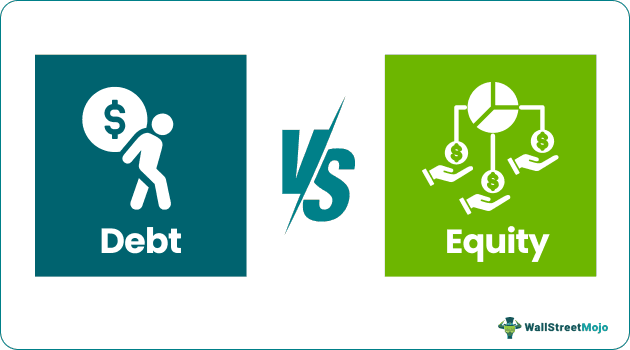Table Of Contents
Differences Between Debt and Equity
Debt refers to the source of money raised from loans on which the interest is required to be paid. Thus, it is a form of becoming creditors of lenders. In contrast, equity means raising money by issuing company shares, and shareholders get the return on such shares from the company's profit in the form of dividends.
Debt and equity are the external sources of finance for a business. When a company needs a lot of money to expand projects or reinvestment and improve their products, services, or deliverables, they go for equity and debt.
- Equity is helpful for those who would like to go public and sell the company's shares to individuals. To conduct an IPO, a company needs to bear various costs; but the result is most cases are helpful.
- In the case of debt, the story is slightly different. Businesses opt for debt for two main reasons. Firstly, if the company has gone through the route of equity, then they would take a portion of the debt to create leverage. Secondly, many businesses don't want to go through the complicated process of IPO, so they opt for a route to take debt from the banks or financial institutions.

Debt vs Equity Video Explanation
Debt vs Equity Infographics
Let us see the top differences between debt and equity.

Key Differences
- Debt is a cheap financing source since it saves on taxes. Equity is a convenient funding method for businesses that do not have collateral.
- Debt holders receive a predetermined interest rate along with the principal amount. Equity shareholders receive a dividend on the company's profits, but it is not mandatory.
- Debt holders are not given any ownership of the company. However, equity shareholders are given the right of the company.
- Irrespective of profit or loss, the company must pay debt holders. However, equity shareholders only receive dividends when the company generates profits.
- Debt holders do not have any voting rights. However, equity shareholders have voting rights to make significant business decisions.
Comparative Table
| Basis for Comparison | Debt | Equity |
|---|---|---|
| 1. Meaning | It is used as a loan, and the creditors can only claim the loaned amount plus the interest. | It means sharing the company's ownership with individuals that allow them to receive dividends and voting rights. |
| 2. Involvement | Much less since there is no ownership sharing. | It is more because equity financing is all about sharing ownership. |
| 3. Cost of Capital | Fixed/predetermined cost of capital. | The cost of capital is not fixed. |
| 4. Voting rights | Creditors do not receive any voting rights. | Equity shareholders receive voting rights. |
| 5. Dividends | No dividend is paid. | A dividend is paid whenever the company decides. |
| 6. Does the company share profits? | No. | Yes, through dividends. |
| 7. When the creditors/equity shareholders are paid? | Debt holders need to be paid regardless of earning profits or incurring a loss. | Unless the company makes profits, the equity shareholders do not get paid. |
| 8. Time of payment | Paid first. | Paid last. |
| 9. Leverage | Create leverage (Financial Leverage). | It does not create any leverage. |
Conclusion
We have seen the major differences between debt and equity; both are important for a business. Thus, talking about which is more valid is redundant.
We should rather talk about in which proportion a business can use them. Depending on the industry and the capital intensiveness of that industry, the company needs to decide how many new shares they will issue for equity financing and how much secured or unsecured loan they would borrow from the bank. Of course, striking a balance between debt and equity is not always possible. But the business should ensure they can take advantage of the leverage and, simultaneously, not pay too much in the cost of capital.
